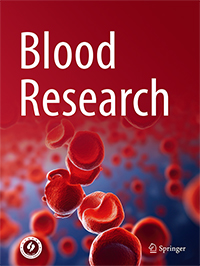Original Article
Korean J Hematol 2005; 40(4):
Published online December 30, 2005
https://doi.org/10.5045/kjh.2005.40.4.254
© The Korean Society of Hematology
주 ABO 혈액형 불일치 조혈모세포이식에서 공여자 혈액형 FFP 수혈에 의한 Isohemagglutinin의 제거
이세련, 양덕환, 이제중, 김여경, 조상희, 정익주, 김형준
화순전남대학교병원 혈액종양내과, 유전자 연구센터
The Feasibility and Clinical Efficacy of In Vivo Adsorption of Isohemagglutinins with Fresh Frozen Plasma (FFP) Infusion in Major ABO‐incompatible Allogeneic Stem Cell Transplantation
Background:
We evaluated the efficacy and feasibility of performing prolonged donor type fresh frozen plasma (FFP) infusion for the in vivo adsorption of isohemagglutinins (IHGs) in major ABO-incompatible allogeneic stem cell transplantation.
Methods: Forty-five patients underwent allogeneic stem cell transplantation. Major ABO incompatibility was observed in 23 patients. 18 patients of these 23 patients had IHGs directed towards the donor ABO antigens and they received donor type FFP; in 5 patients, the bone marrow grafts were minor incompatible; in 17 patients, the grafts were compatible.
Results: The engraftment times of the granulocytes and platelets and the transfusion requirements for red blood cells in the FFP-transfused recipients of the major ABO-incompatible allografts were not different from those of therecipients of ABO-compatible allografts (P>0.1) and these factors were not different from those for the FFP-treated recipients of the major ABO-incompatible allografts. The median duration of FFP infusion and the number of FFP units were 23.5 days (range 8∼39) and 47 units (range 16∼78), respectively. The median IgG titers decreased from 1:64 to 1:4 over a median of 22.5 days (range 8∼36) in the FFP-treated groups, compared with a median of 61 days (range 19∼116) in the non-FFP-treated groups.
Conclusion: The infusion of donor-type FFP with red cell depletion represents a more feasible, effective alternative strategy to achieve in vivo immunoadsorption of IHGs and to prevent late immunohematologic complications.
Keywords Fresh frozen plasma, Isohemagglutinins, Major ABO incompatible bone marrow transplantation
Article
Original Article
Korean J Hematol 2005; 40(4): 254-260
Published online December 30, 2005 https://doi.org/10.5045/kjh.2005.40.4.254
Copyright © The Korean Society of Hematology.
주 ABO 혈액형 불일치 조혈모세포이식에서 공여자 혈액형 FFP 수혈에 의한 Isohemagglutinin의 제거
이세련, 양덕환, 이제중, 김여경, 조상희, 정익주, 김형준
화순전남대학교병원 혈액종양내과, 유전자 연구센터
The Feasibility and Clinical Efficacy of In Vivo Adsorption of Isohemagglutinins with Fresh Frozen Plasma (FFP) Infusion in Major ABO‐incompatible Allogeneic Stem Cell Transplantation
Se Ryeon Lee, Deok Hwan Yang, Je Jung Lee, Yeo Kyeoung Kim, Sang Hee Cho, Ik Joo Chung, Hyeoung Joon Kim
Blood and Marrow Transplant Center, Genome Research Center for Hematopoietic Diseases, Chonnam National University Hwasun Hospital, Jeonnam, Korea
Abstract
Background:
We evaluated the efficacy and feasibility of performing prolonged donor type fresh frozen plasma (FFP) infusion for the in vivo adsorption of isohemagglutinins (IHGs) in major ABO-incompatible allogeneic stem cell transplantation.
Methods: Forty-five patients underwent allogeneic stem cell transplantation. Major ABO incompatibility was observed in 23 patients. 18 patients of these 23 patients had IHGs directed towards the donor ABO antigens and they received donor type FFP; in 5 patients, the bone marrow grafts were minor incompatible; in 17 patients, the grafts were compatible.
Results: The engraftment times of the granulocytes and platelets and the transfusion requirements for red blood cells in the FFP-transfused recipients of the major ABO-incompatible allografts were not different from those of therecipients of ABO-compatible allografts (P>0.1) and these factors were not different from those for the FFP-treated recipients of the major ABO-incompatible allografts. The median duration of FFP infusion and the number of FFP units were 23.5 days (range 8∼39) and 47 units (range 16∼78), respectively. The median IgG titers decreased from 1:64 to 1:4 over a median of 22.5 days (range 8∼36) in the FFP-treated groups, compared with a median of 61 days (range 19∼116) in the non-FFP-treated groups.
Conclusion: The infusion of donor-type FFP with red cell depletion represents a more feasible, effective alternative strategy to achieve in vivo immunoadsorption of IHGs and to prevent late immunohematologic complications.
Keywords: Fresh frozen plasma, Isohemagglutinins, Major ABO incompatible bone marrow transplantation

Article Tools
Stats or Metrics
Related articles in BR
-
The how's and why's of evidence based plasma therapy
Mark H. Yazer
Korean J Hematol 2010; 45(3): 152-157




 PDF
PDF Standard view
Standard view Export citation
Export citation Share
Share  Previous Article
Previous Article



